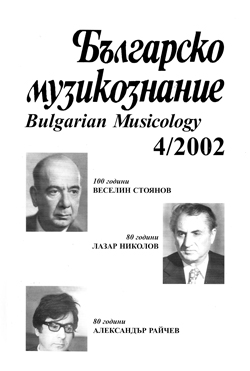Александър Райчев в духовната орбита на Шостакович
Alexander Raichev in the Spiritual Orbit of Shostakovich
Author(s): Venelin KrustevSubject(s): Music
Published by: Институт за изследване на изкуствата, Българска академия на науките
Summary/Abstract: The article about the composer Alexandar Raichev (not comprising his whole and numerous works in an analytical light) emphasizes one of the author’s main ideas - the common aesthetic and spiritual roots of the Bulgarian composer’s music with the European traditions of XX c. dramatic-tragic symphonism and mostly with the symphonism of Dmitri Shostakovich. In 1958, the 36-year-old Alexandar Raichev was already personally acquainted with the Russian composer, and the aesthetics of the conquering man - Prometheus and the hero of “Leningrad Seventh Symphony” by Shostakovich who had defeated “the world’s evil”, were already “spiritual brothers”. Here are the deep roots in the semantics of the image-emotional proximity of their symphonic thinking. Thus the great European tradition in the genre of the multi part dramatic symphony of Mahler, Honegger, Miaskovski and Shostakovich in the highest degree, found its staunch follower in the most mature symphonies of the Bulgarian composer A.Raichev (in the First, the Second, the Third and the Sixth Symphonies), reproduced most impressively and originally as a conception, means of expression and artistic-aesthetic realization. I call this soaring ideological-musical generalization “universal confliction” in the sphere of symphonism, characteristic equally for both Shostakovich and A. Raichev. In the essay-like finale “In the dusk of the revolutionary-romantic, faith” “the suffering man” A.Raichev confesses the crash of the “revolutionary-romantic ideals of his generation in the last decade of:XX c. Init, the tragic is commensurate with the pathos of these world “pathetic” symphonies, leading not to the dream world of Prometheus and Botev, but to those hurled into Dante’s hell, and even the more terrifying spiritual abyss of Dostoevski’s characters. The human suffering that befell A.Raichev gave birth to one of the most spontaneous and sincere symphonies not only in Bulgarian, but in European music as well.
Journal: Българско музикознание
- Issue Year: 2002
- Issue No: 4
- Page Range: 147-160
- Page Count: 14
- Content File-PDF

